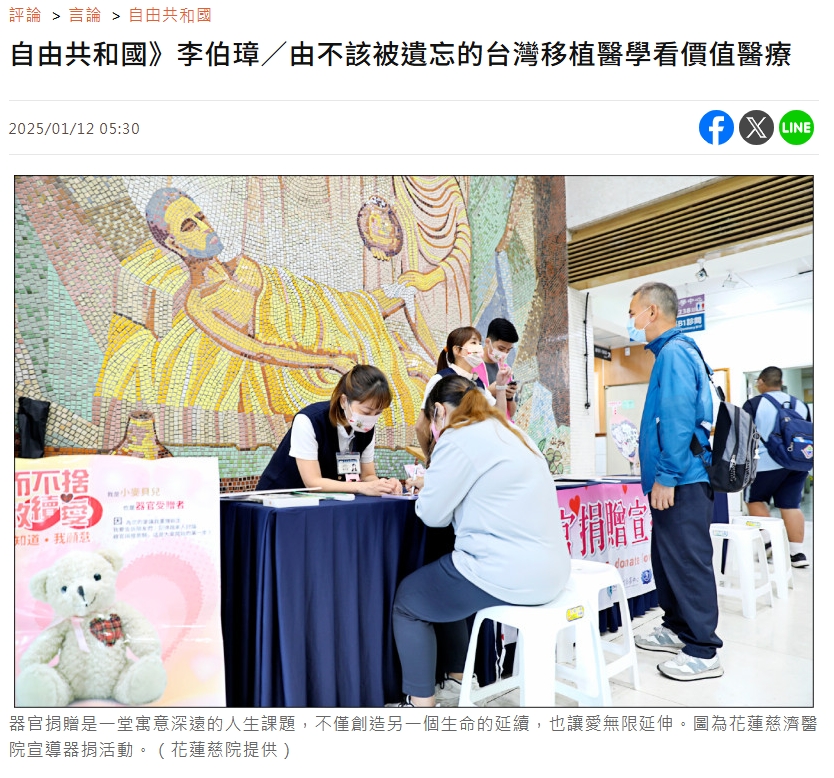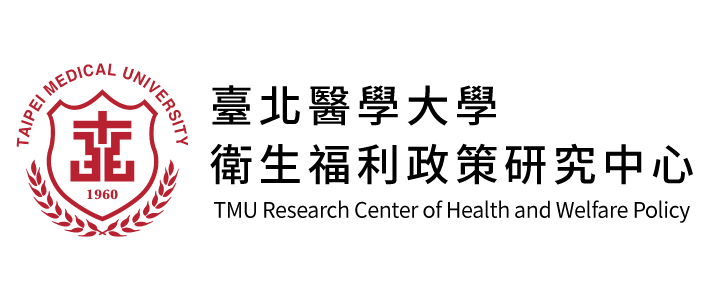【Column Article】Free Republic “Lee Po-Chang’s Column | Understanding Value-Based Healthcare through Taiwan’s Often Overlooked Transplant Medicine”

By Lee Po-Chang, Chair Professor, School of Public Health, Taipei Medical University
For patients with organ failure, replacing a failing organ with a healthy one can mean extending their lives and finding rebirth. I once had a 68-year-old dialysis patient who received a kidney transplant and went on to live another 18 healthy years. To others, it may seem unnecessary to extend the life of someone that age, but for family members, any opportunity to save a loved one should never be abandoned. Life cannot be bought with money, and the goal of transplantation is to enable patients to live well and live long, embracing their second chance at life. While organs donated by family members can be decided within the family, altruistic organ donations rely on the government to adopt a “value-based healthcare” approach, creating opportunities for organ transplants for disadvantaged patients with organ failure. This is an issue the government must realistically address.
Many patients needing heart, liver, or lung transplants pass away before an opportunity arises. While kidney failure patients can rely on dialysis as a bridge to transplantation, their quality of life cannot compare to that of a kidney transplant recipient. From 2005 to 2024, data from Taiwan’s Organ Registry and Sharing Center shows that 1,399 patients received heart transplants, but 2,425 were unable to secure one. For liver transplants, 7,388 patients received a transplant, while 10,729 could not. Among liver cancer patients, 2,011 received liver transplants, but 2,683 missed the opportunity. Kidney transplants were performed on 5,437 patients, while 23,072 remained on the waiting list. Lung transplants were provided to 240 patients, leaving 542 without access. Survival rates between those who receive transplants and those who do not differ significantly, as supported by statistical analysis.
These cold numbers represent the harsh reality that patients on transplant waiting lists often endure poor quality of life due to deteriorating organ function. While some chronic conditions can be managed with medication, an organ transplant is transformative when an organ can no longer function normally. This is the incredible potential of modern transplantation medicine. Western countries treat organ donation and transplantation as essential components of their healthcare systems, driven by national efforts to promote this valuable medical practice.
Patients awaiting organ transplants are often in a desperate plight. In Taiwan, it is illegal to purchase organs, and if hospitals do not actively promote organ donation, where can these patients find hope? Efforts to advance transplantation require a proactive government perspective, focused on the healthcare practices that truly benefit citizens. Organ transplantation, which enables patients to reclaim their lives, requires society-wide support and government policy to drive its progress.
Taiwan has one of the highest dialysis prevalence rates globally, with 12,000 new dialysis patients annually. By 2011, there were 93,000 dialysis patients, costing the National Health Insurance (NHI) program NT$69.66 billion—a record high. By 2023, the number of long-term dialysis patients reached 97,262. Several companies providing dialysis-related equipment and materials are even listed on Taiwan’s stock exchange, benefiting from patient growth and guaranteed NHI funding. However, the substantial cost of dialysis, which only treats symptoms, puts immense financial pressure on the NHI program, reducing funds available for other medical services. Unfortunately, government officials and most healthcare providers fail to comprehend the financial burden of long-term dialysis on the NHI or appreciate the medical value of organ transplantation.
Organ donation and transplantation are intensive and demanding medical practices, often involving surgeries during holidays or late at night, affecting the work-life balance of healthcare providers. I understand how challenging it is to train specialized talent in this field. In Taiwan, surgeons and hospitals performing organ transplants must meet strict requirements. However, transplant medicine is not widely regarded as an elite field in Taiwan, and many younger surgeons and hospitals capable of performing organ transplant procedures are not actively pursuing this specialty. Who bears the responsibility for this? Is it the government, or is it due to insufficient incentives for doctors?
When facing the end of life, how do patients and their families view this process? Over the years, in advocating for altruistic organ donation, we have seen countless healthcare workers, ICU staff, neurosurgeons, social workers, and coordinators fully embrace the concept of altruism. Their dedication to promoting organ donation under challenging circumstances, such as persuading families of critically ill patients to consent to donation, is an arduous task. However, with communication and dialogue, results can be achieved. I often remind them not to focus solely on metrics; as long as efforts are made, there is always a chance to help an unknown patient in need of a transplant. Witnessing the belief and persistence of these colleagues deeply moves me—feelings that are hard for most healthcare workers and officials to grasp.
Altruistic Donors and Priority for Relatives
Three Degrees of Kinship Receive Priority if Needed
Anyone could experience organ failure and find themselves waiting for a transplant. Likewise, brain death from an unforeseen accident is an unfortunate fate. In 2014, alongside CEO Chiang Yang-Jen and fellow transplant professionals, we promoted the concept of “Letting Go” organ donation to save strangers in need. Under this policy, altruistic donors’ spouses and relatives within three degrees of kinship are granted priority access to donated organs if needed in the future—a globally unprecedented policy.
To date, 45 organ failure patients have benefited from receiving priority organ donations due to their family members’ past altruistic contributions. This highlights how altruistic donors leave behind an invaluable legacy of health for their descendants, beyond financial wealth, embodying the principle of “letting go to gain.” As Dharma Master Cheng Yen of Tzu Chi once said: “Clever individuals are focused on gains and losses, but wise individuals embrace letting go and gaining.” The World Transplant Society calls for organ needs to be met through domestic donors, strongly opposing donations from death row inmates or organ trade in third countries. Taiwan’s laws and regulations are already well-established in this regard. The Ministry of Health and Welfare and the NHI Administration must take a forward-looking approach to strategically allocate medical resources, ensuring the welfare of the people.
Vice President Lai Ching-Te, with his background in nephrology, deserves appreciation for his unwavering support for promoting altruistic organ donation during his tenure as Mayor of Tainan. We hope to receive his continued advocacy. Recently, Fubon Group supported the production of three short promotional videos titled “If I’m Willing, Love Can Continue,” each two minutes long. These videos, freely licensed to medical institutions nationwide, have received strong endorsements from hospital directors for distribution.
- Video 1: Receiving the Best Gift
- Video 2: Waiting the Longest Time
- Video 3: The Value of Life’s Continuation
I believe that “Nothing is impossible if one is determined.” Organ donation is a profoundly meaningful life lesson, not only creating opportunities for another’s survival but also extending love indefinitely.
Original Source: Free Republic
*“Lee Po-Chang | Understanding Value-Based Healthcare through Taiwan’s Often Overlooked Transplant Medicine”



